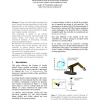Free Online Productivity Tools
i2Speak
i2Symbol
i2OCR
iTex2Img
iWeb2Print
iWeb2Shot
i2Type
iPdf2Split
iPdf2Merge
i2Bopomofo
i2Arabic
i2Style
i2Image
i2PDF
iLatex2Rtf
Sci2ools
KES
1998
Springer
1998
Springer
Hidden partitioning of a visual feedback-based neuro-controller
Robotic controllers take advantage from neural network learning capabilities as long as the dimensionality of the problem is kept moderate. This paper explores the possibilities offered by the combination of several neural networks to design more complex modular controllers. This modularity is based on an internal partitioning of the problem. The partitioning must remain hidden, and should not affect the controller's interface or functioning, including during its adaptation phases. We introduce a bi-directional architecture to derive the learning rules of the modules. The neurocontroller is trained globally, based on the interactions of the system with its environment, as one would do for a single network. The approach is illustrated on a robotic reaching application. Several partitioning variants of the neuro-controller are discussed and compared.
Complex Modular Controllers | Information Management | KES 1998 | Network Learning Capabilities | Neural Networks |
| Added | 06 Aug 2010 |
| Updated | 06 Aug 2010 |
| Type | Conference |
| Year | 1998 |
| Where | KES |
| Authors | Jean-Philippe Urban, Jean-Luc Buessler, Julien Gresser |
Comments (0)

